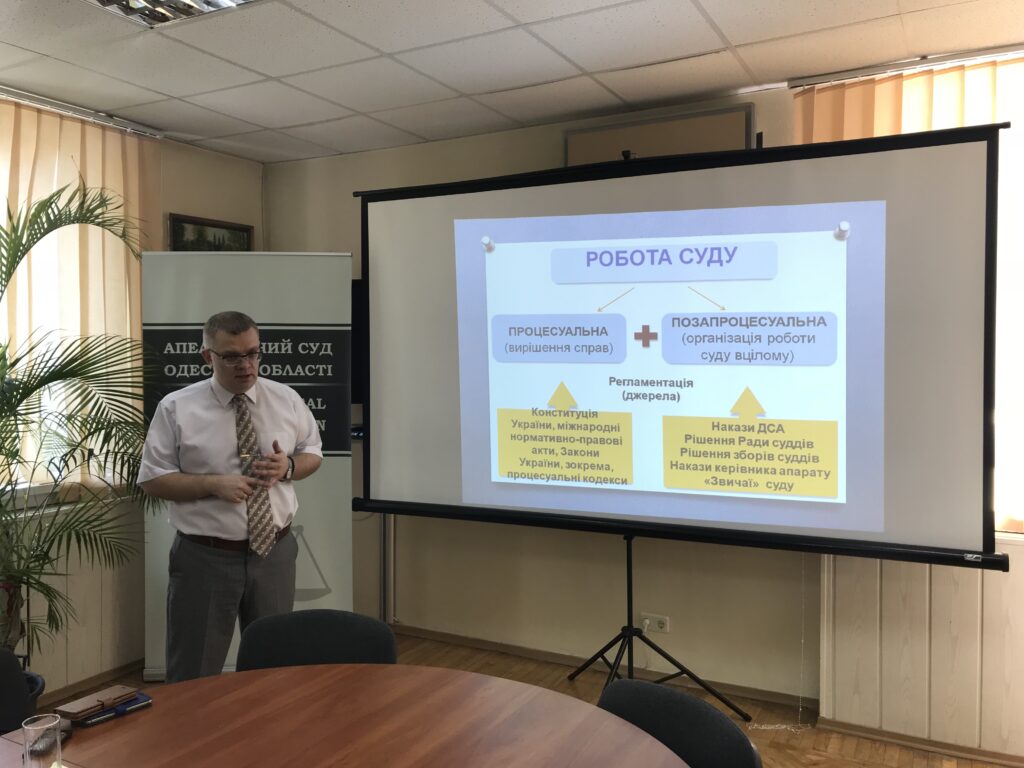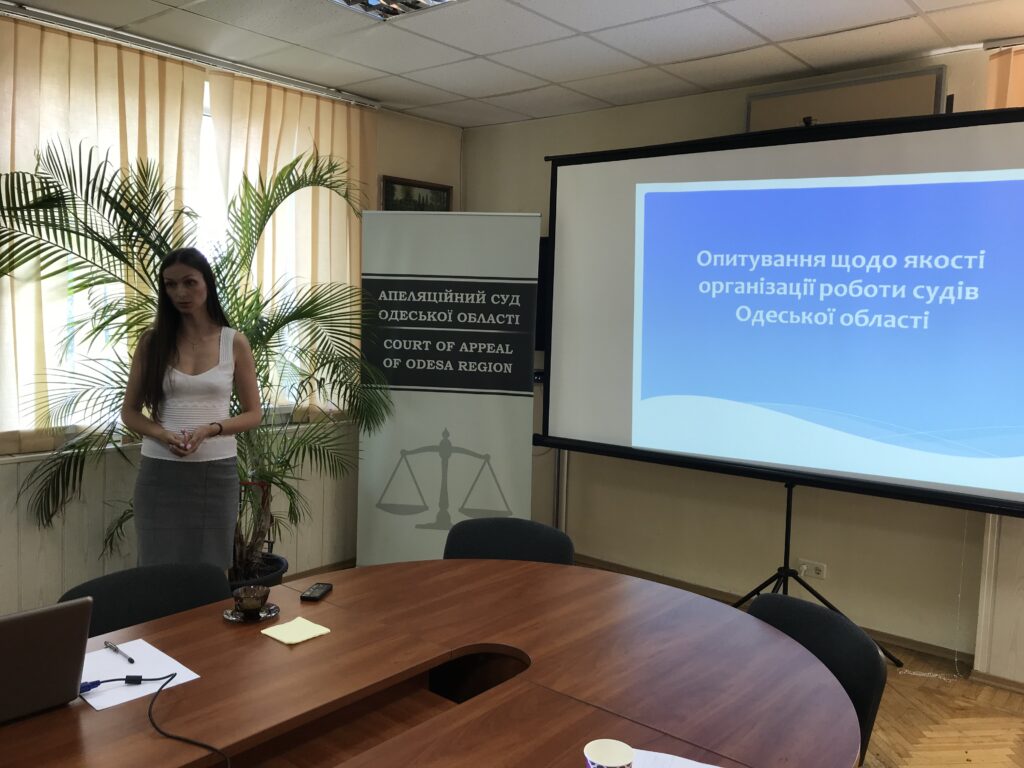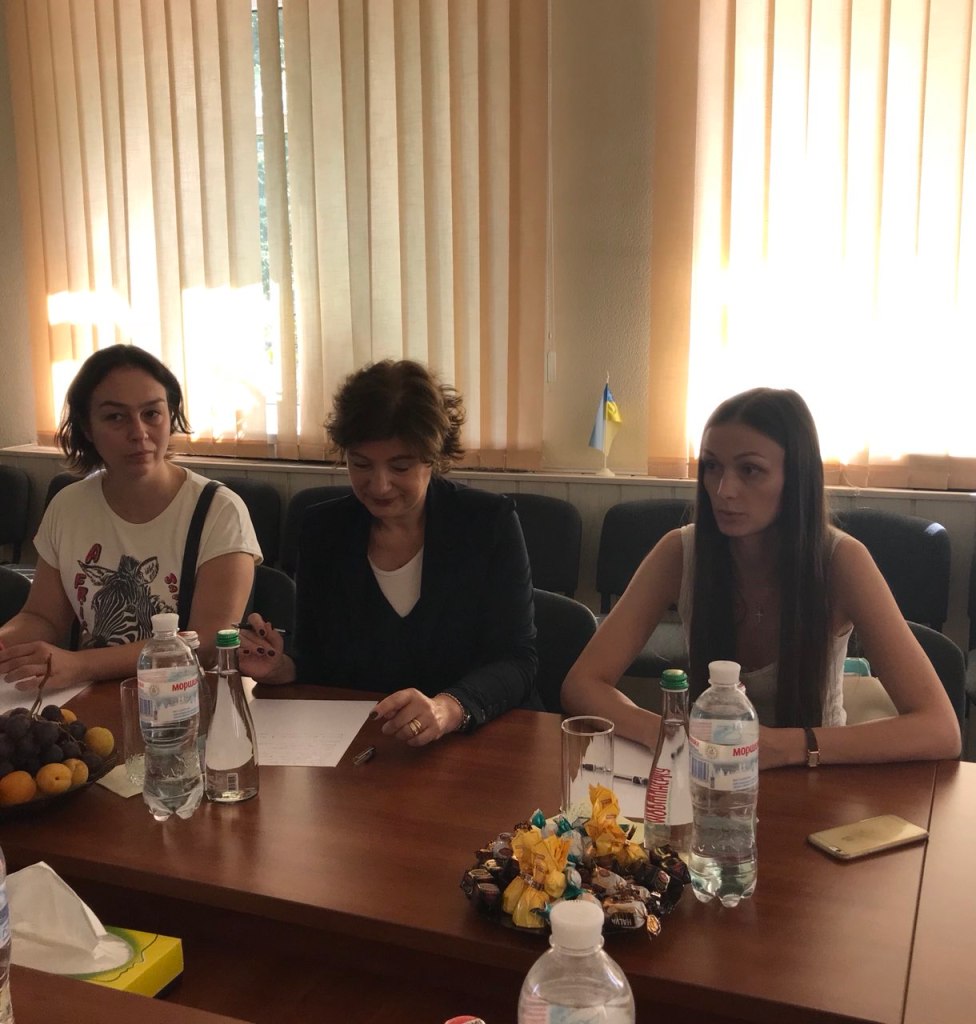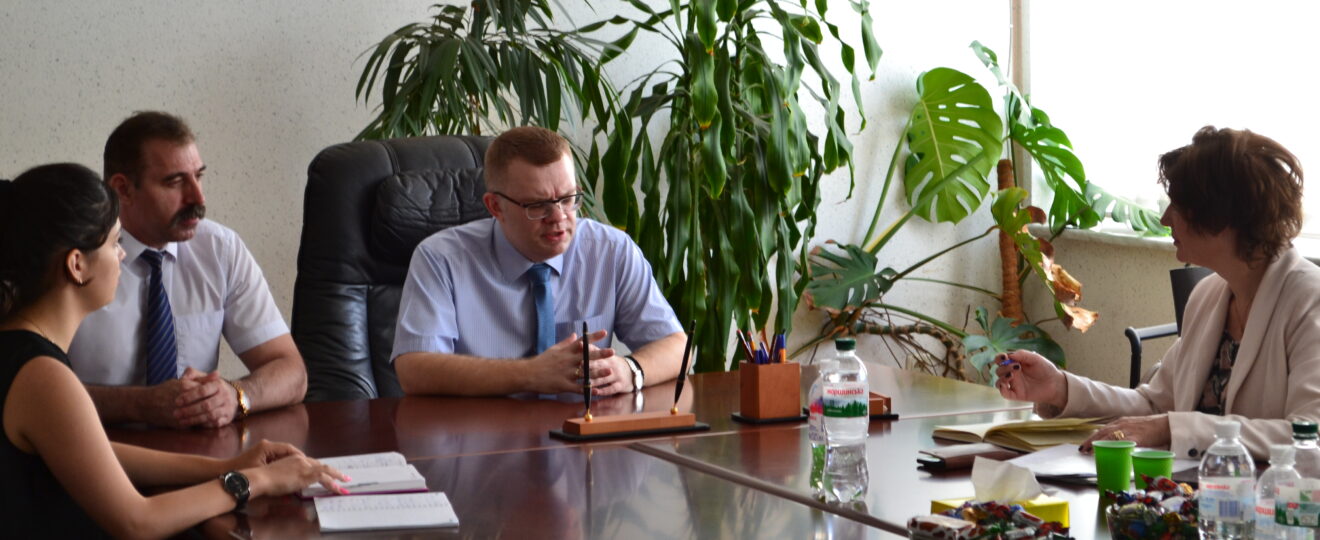The first visit of the Dutch expert on Court Administration, judge, Deputy Chairman of Amsterdam District Court, member of the board of judges Esther De Rooy in the framework of the international project “Court, citizens, society, state: cooperation for change”, which was initiated by Odessa region Appellate Court, has come to an end.

The project is designed for a little more than six months, and its implementation was made possible thanks to the direct support of the Kingdom of the Netherlands government and organizational support of Odessa regional organization “All-Ukrainian public Organization “Committee of voters of Ukraine”.
One of the features of this project is that the initiative came from the courts themselves – Tatarbunarsky District Court and the Odessa region Appellate Court.
Feeling the need for real, not declarative changes, directing efforts to adapt and bring closer the “not written” rules for organizing the work of courts and judges to ordinary citizens, the courts of Odessa region turned for practical, not financial assistance to a judge with 24 years of experience, who holds an administrative position in Amsterdam District Court, and is the deputy chairman of this court, Ms. Esther De Rooy.
The first visit started on June, 18 and lasted until June 23, 2018. The skeptical mood of those who do not believe in changes without sufficient funding and another legislative reform was dispelled the first day.
The expert began her work with the interviews with judges and employees of the pilot courts offices. During the first visit they were the Appellate Court of Odessa region, Malinovsky and Primorsky District Courts of the city of Odessa.
Each interview lasted for 20-40 minutes, during which the expert identified the needs of the judges themselves in organizing their work, the positive and negative phenomena of organizing the work of the courts, and gave her own examples of changes that helped to improve the efficiency of the courts in the Netherlands and, ultimately, ensure a high level of public confidence in the court.

The expert was convinced that the judicial system of Ukraine is in the process of reform: the judicial corps is being renewed, judicial institutions are being reorganized and innovations are being introduced into the procedural legislation of Ukraine, which requires adequate quick actions from the side of the representatives of justice themselves.
The judge noted a large number of progressive provisions of the procedural legislation of Ukraine, including: short deadlines for drawing up full texts of court decisions and automatic cases distribution among judges, which, however, is not sufficient for full public trust in the court. One of the reasons for the lack of understanding of the courts work, and therefore distrust to their activities, is the lack of unified, transparent and effective procedures for organizing the courts work. We are talking about “unwritten rules” or “customs” that differ from court to court, and therefore do not allow predicting the actions of staff members, assistant judges and judges themselves.
A survey of attorneys and lawyers practicing in Odessa region conducted using the Google form allowed us to obtain objective information from court visitors about the quality of judicial institutions work organization and identify the vectors of desired changes.
Thus, the largest number of respondents noted the late start of court hearings and the unreasonably long duration of court proceedings, violation of the procedural deadlines for sending subpoenas and copies of decisions to the parties, different rules for submitting applications to the court office and receipt of cases for familiarization in different courts, and so on.
After analyzing and summarizing the information received, the judges agreed that for effective and high-quality implementation of changes in the judicial system, it is necessary for them to get united as representatives of the judiciary, since it is possible to achieve de facto, and not de jure changes only when the carriers of justice, who is targeted by the state judicial reform, will independently get united and, thanks to fruitful cooperation of all parts of the judicial system, will change outdated standards and traditions of courts work organization, as well as building the judicial process.
Organizational changes and organizational development are part of a real reform, and they are possible only if all organizational processes of the courts are clearly regulated. Therefore, we decided to start with the opinion of the judges themselves and their needs in terms of their work organization.

Every day of the international expert’s working visit to the city of Odessa was held in a busy schedule. At the beginning of the first day, the coordinators of the international project, Deputy Chairman of the Appellate Court of Odessa region Andrey Drishlyuk and teacher of Odessa regional branch of the National School of judges of Ukraine, judge of the Ochakiv City District Court of the Mykolaiv region Tatyana Shevyrina presented the project and the results of the online survey of attorneys and lawyers on the quality of courts work organization in Odessa region. The work of the expert, as has already been noted, took place in the form of an interview.
During the first week of work, the expert met with the management of courts, conducted a number of interviews with judges and court apparatuses employees to identify and investigate pressing problems that arise in the course of court’s work. The conducted analysis will make it possible to make suggestions for overcoming these problems through the introduction of innovative forms and methods of judicial administration, the establishment of internal communication both between divisions of one court and between courts in the region, the formation of common standards and practices for the courts functioning within Odessa region and their implementation in the activities of the judicial system of Ukraine in the future.
For a better understanding of the specifics of the judicial process in Ukraine, the expert attended court hearings on criminal and civil cases.
Based on the results of the interviews, a number of main problems and factors were identified that, in the opinion of the judges and employees of the court offices, prevent them from working effectively, namely:
lack of coordinated work of the three instances of the judicial system, continuous change of legal positions in different categories of cases, low level of communication between judicial instances;
lack of a sense of independence of judges in the administration of justice and active negative media propaganda about the activities of the judicial system and judges;
excessive workload on one judge and lack of sufficient human resources;
low level of protection of judges and employees of the court apparatus, which is used by unscrupulous citizens to put pressure on judges;
a decrease in the level of professionalism of attorneys, lawyers and prosecutors, which is manifested both in the preparation of procedural documents and in behavior during court hearings; cases of rights abuse have become more frequent;
the problem of interchangeability of judges and staff members;
inability of the court to consider a case within a reasonable time due to the lack of a clear position (for example, as to what can be considered evidence of proper notification of a party about the date, time and place of a court hearing);
the inability of the court to consider a case within a reasonable time due to the abuse by the trial participants of the the right to adjourn a court hearing and postpone the consideration of a case, which is caused by the lack of unified criteria for the validity of the reasons for postponing the consideration of a case;
the lack of division of civil and criminal cases into narrow special categories for more professional and effective consideration of court cases, as well as for a thorough study of practice, etc.
The first visit of the expert was completed, followed by the painstaking work of the project team to thoroughly analyze and systematize the materials of the first stage, and prepare for the next stage of the project. We´re looking forward to the next visit of the expert in August of this year, when Mz. Esther De Roy will continue interviews with judges and representatives of the apparatus of other pilot courts in the region, visit Odessa regional branch of the National School of judges of Ukraine and meet with the legal community.

Discussing the plan of the second visit, the expert noted the positive experience of Ukraine in professional training of future judges, as well as maintaining the level of qualification of acting judges and employees of court offices. She noted that there was no analog of such an institution in the Netherlands, and the function of ensuring the professional growth of judges was assigned to the chairman and deputy chairmen of the court. At the same time, the expert will share the experience of the Netherlands – present a new form of interaction of courts with citizens, society and the state, which should unite judges, prosecutors and attorneys around common problems and ensure, including based on the results of a preliminary online survey, a high-quality multilateral dialogue between professional lawyers.








